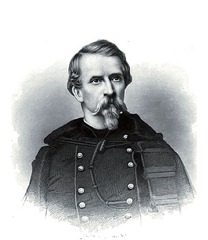April 22.—The special committee of the United States Senate made a report to-day on the resolution instructing them to inquire into the allegations of disloyalty made against Senator Starke, of Oregon, whose case had occupied the Senate some time, but resulted in his admission as Senator. The special committee considered the same evidence that was before the Committee on the Judiciary, and also heard Mr. Starke at great length in reply. In this he assumed that he was loyal, and intimated that the committee had better inquire into the character and allegations of his assailants in Oregon. The committee arrived at the following conclusions:
First. That for many months, prior to the twenty-first of November, 1861, and up to that time, Mr. Starke was an ardent advocate of the cause of the rebellious States.
Second. That after the formation of the Constitution of the confederate States, he openly declared his admiration for it, and desired the absorption of the loyal States of the Union into the Southern Confederacy under that Constitution, as the only means of peace, and warmly avowing his sympathy with that cause.
Third. That the Senator from Oregon is disloyal to the Government of the United States.
—The first boat-load of cotton and tobacco from the Tennessee River since the commencement of the rebellion arrived at Pittsburgh, Pa., having left Nashville last week, and will pass over the Pennsylvania Railroad to-day.—N. Y. Evening Post, April 22.
—This day the rebels came out from their rifle-pits in front of Lee’s Mills, Va., killing one of the National pickets. After he was dead about thirty of them fired their pieces into his head, completely riddling it with bullets. The officer then commanding the reserve ordered his men to charge on the rebels, which was willingly responded to, resulting in several of them being killed and one taken prisoner. Two men were killed on the National side and one mortally wounded.—Ohio Statesman, April 25.
—The rebel Congress at Richmond adjourned, to meet again in August. The Richmond Whig says: For fear of accidents on the railroad, the stampeded Congress left in a number of the strongest and newest canal-boats. These boats are drawn by mules of approved sweetness of temper. To protect the stampeders from the snakes and bull-frogs that abound along the line of the canal, Gen. Winder has detailed a regiment of ladies to march in advance of the mules and clear the tow-path of the pirates. The regiment is armed with pop-guns of the longest range. The ladies will accompany the stampeders to a secluded cave in the mountains of Hepsidam, and leave them there in charge of the children of the vicinage, until McClellan thinks proper to lot them come forth. The ladies return to the defence of their country.
—The National steamer Yankee ascended the Rappahannock River this day to Fredericksburgh, Va., having passed the obstructions placed in the river seven miles below the town in safety.—The Potomac flotilla captured seven rebel schooners — one with a valuable cargo of dry goods, medicines, and saltpetre—and also two small steamers. —Baltimore American, April 23.
—This afternoon the National gunboat Anacostia, on her way down the Potomac River, when near Lowry’s Point was fired into by a party of rebel infantry, who were dispersed by a couple of shells from the gunboat — N. Y. Tribune, April 26.
—Col. Donnelly, of Gen. Banks’s forces, made a reconnoissance this day toward Harrisonburgh, Va. When approaching he was fired on by the rebel cavalry scouts. Two companies of the Ohio cavalry were deployed on the left, toward Gordonsville turnpike, the same number of the Vermont cavalry on the right, and the Michigan cavalry on the centre; Hampton’s battery and the Connecticut Fifth formed the reserve.
The rebel cavalry, after the first fire, retreated to the town, where they joined their command, and when escaping by the Gordonsville route, were passed by the Ohio cavalry. Seven men and eleven horses were captured — the rest escaped. The town was then entered and occupied by Col. Donnelly and the cavalry. Jackson’s Winchester hostages, whom he released near Shenandoah, on their parole of honor, were found in the town. Two had died of fatigue and want of attention.—N. Y. Commercial, April 24.



